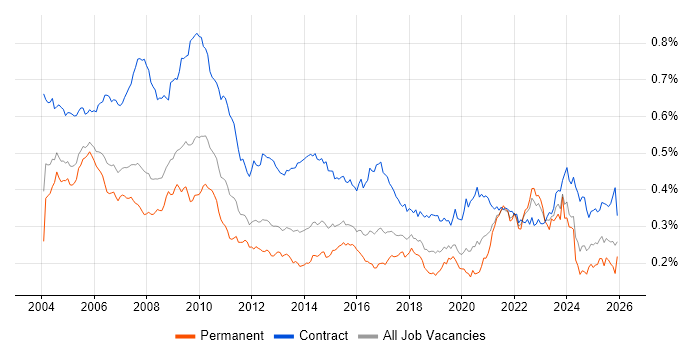Spreadsheets
UK
The table below provides summary statistics for permanent job vacancies requiring Spreadsheet skills. It includes a benchmarking guide to the annual salaries offered in vacancies that cited Spreadsheet over the 6 months leading up to 1 May 2025, comparing them to the same period in the previous two years.
| 6 months to 1 May 2025 |
Same period 2024 | Same period 2023 | |
|---|---|---|---|
| Rank | 609 | 549 | 607 |
| Rank change year-on-year | -60 | +58 | +221 |
| Permanent jobs citing Spreadsheet | 83 | 376 | 414 |
| As % of all permanent jobs advertised in the UK | 0.16% | 0.38% | 0.40% |
| As % of the Applications category | 1.30% | 3.84% | 4.52% |
| Number of salaries quoted | 48 | 279 | 150 |
| 10th Percentile | £24,594 | £22,000 | £25,000 |
| 25th Percentile | £25,000 | £25,750 | £29,250 |
| Median annual salary (50th Percentile) | £35,000 | £27,965 | £45,000 |
| Median % change year-on-year | +25.16% | -37.86% | - |
| 75th Percentile | £55,625 | £37,125 | £60,000 |
| 90th Percentile | £85,375 | £46,000 | £82,500 |
| UK excluding London median annual salary | £32,500 | £27,965 | £35,000 |
| % change year-on-year | +16.22% | -20.10% | -6.67% |
All Software Application Skills
UK
Spreadsheet falls under the Software Applications category. For comparison with the information above, the following table provides summary statistics for all permanent job vacancies requiring software application skills.
| Permanent vacancies with a requirement for software application skills | 6,389 | 9,799 | 9,165 |
| As % of all permanent jobs advertised in the UK | 12.28% | 9.95% | 8.82% |
| Number of salaries quoted | 3,208 | 6,131 | 4,992 |
| 10th Percentile | £27,750 | £24,500 | £25,750 |
| 25th Percentile | £37,500 | £27,945 | £31,250 |
| Median annual salary (50th Percentile) | £50,000 | £37,500 | £44,666 |
| Median % change year-on-year | +33.33% | -16.04% | -0.74% |
| 75th Percentile | £60,265 | £53,469 | £60,000 |
| 90th Percentile | £68,750 | £67,500 | £77,500 |
| UK excluding London median annual salary | £49,000 | £35,000 | £37,500 |
| % change year-on-year | +40.00% | -6.67% | -4.63% |
Spreadsheet
Job Vacancy Trend
Job postings citing Spreadsheet as a proportion of all IT jobs advertised.

Spreadsheet
Salary Trend
3-month moving average salary quoted in jobs citing Spreadsheet.
Spreadsheet
Salary Histogram
Salary distribution for jobs citing Spreadsheet over the 6 months to 1 May 2025.
Spreadsheet
Top 16 Job Locations
The table below looks at the demand and provides a guide to the median salaries quoted in IT jobs citing Spreadsheet within the UK over the 6 months to 1 May 2025. The 'Rank Change' column provides an indication of the change in demand within each location based on the same 6 month period last year.
| Location | Rank Change on Same Period Last Year |
Matching Permanent IT Job Ads |
Median Salary Past 6 Months |
Median Salary % Change on Same Period Last Year |
Live Jobs |
|---|---|---|---|---|---|
| England | -89 | 66 | £35,000 | +25.16% | 231 |
| UK excluding London | +20 | 49 | £32,500 | +16.22% | 133 |
| Work from Home | +167 | 36 | £30,250 | -21.43% | 126 |
| London | +4 | 19 | £75,000 | +168.19% | 121 |
| North of England | +56 | 18 | £25,000 | -9.09% | 35 |
| South East | +43 | 12 | £33,732 | +20.62% | 45 |
| Midlands | +50 | 8 | £35,000 | -7.89% | 18 |
| North West | +6 | 8 | £43,250 | +57.27% | 23 |
| Yorkshire | +73 | 6 | £27,250 | - | 11 |
| East of England | +17 | 6 | £42,500 | +57.41% | 17 |
| North East | +50 | 4 | £25,000 | -2.91% | 2 |
| West Midlands | +36 | 4 | £29,750 | -4.03% | 6 |
| East Midlands | +32 | 4 | £80,000 | +92.81% | 7 |
| South West | +89 | 3 | £32,850 | -15.23% | 18 |
| Northern Ireland | - | 1 | - | - | |
| Isle of Man | - | 1 | £31,000 | - |
Spreadsheet
Co-occurring Skills and Capabilities by Category
The follow tables expand on the table above by listing co-occurrences grouped by category. The same employment type, locality and period is covered with up to 20 co-occurrences shown in each of the following categories:
